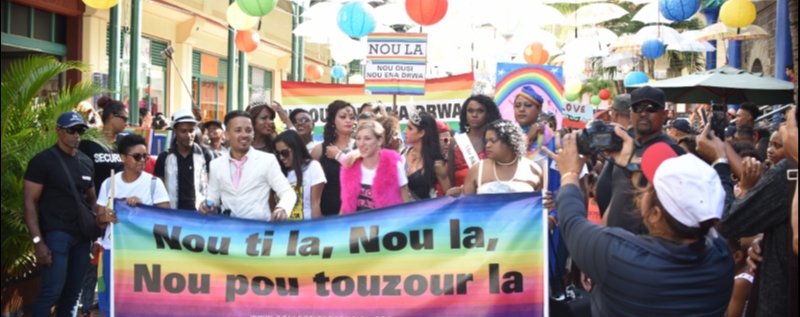Mauritius: hiding behind multiracial society and sensitive issues
Published on 08 Nov 2017, 10:51 AM
Review of Mauritius | HR Committee | Oct. 2017
 Gay Pride 2017 in Mauritius. Photo credit: Young Queer Alliance
Gay Pride 2017 in Mauritius. Photo credit: Young Queer Alliance
On the 23th and 24th October 2017, the Human Rights Committee reviewed Mauritius’ fifth report on the implementation of the ICCPR. The Committee immediately regretted the absence of a National Human Rights Institution, the 6 years delay in the submission of the State report and the lack of participation by civil society. The Mauritian delegation started its opening statement by stressing that Mauritius is a multiracial, multicultural and multireligious society, an argument it often used as a shield during the review. It called many problems ‘sensitive issues given the social fabric of its society’. Committee members repeatedly complained about evasive and vague responses of the State party.
Major concerns of the Committee were discrimination against LGBT persons, electoral reform and terrorism related issues. Other problems concerned overcrowding in detention centres, the independence of the judiciary and the position of women in employment.
The webcast of the review is available here: part 1 and part 2.
"We would like to stress the importance of respecting different cultural practices, being a multiracial and multireligious country. These are sensitive issues."
- The Mauritian delegation, about several issues that came up during the review.
LGBT
Consensual sexual activities between people of the same sex are criminalised in Mauritius. The penal code contains one provision criminalising both sodomy and bestiality, giving the impression that both acts are of the same severity. The Committee noted that this provision is contrary to the Covenant. Furthermore, hate speech against LGBT persons in Mauritius is problematic. The Committee asked what measures Mauritius had taken to combat homophobia, to protect LGBT persons, to train judges, prosecutors, law enforcement officials and the general public to prevent prejudice, harassment and discrimination.
The Committee also asked whether Mauritius intended to amend the penal code and to enact civil partnership legislation. The Mauritian delegation said that the government would look into it, but this issue was very sensitive and there was no project to amend this article in the immediate future.
Furthermore, hate speech against LGBT persons in Mauritius is problematic. For example, after a flood, people blamed gay couples trying to get married. LGBT persons also receive threats.
Electoral reform
A pending issue in Mauritius is its electoral reform. The State party replied it is already working on it, with criteria such as stability, inclusiveness, gender representation and transparency. A Ministerial Committee was established, but the delegation stressed that this reform demands a lot of consultation with many stakeholders. According to the State, the diversity of the country means that many considerations have to be taken into account.
Terrorism
The Committee was concerned about some specific terrorist offenses, the denial to the right to bail of persons accused under terrorist charges and the delayed access to counsel. In particular the Committee asked why the State deprived judges of their discretion to accord bail in these cases.
The State replied that denial of bail is only foreseen in very limited cases, and that in their opinion, the Prevention of Terrorism Act is in full compliance with the Covenant. Safeguards are included in the act and judges still can admit bail if they wish to.
In this regard, the Committee was very concerned about the practice of detaining people on the basis of provisional charges. There is no legal basis for this policy. The delegation said this issue cannot be changed overnight, but a coming bill will deal with the issue. The level of evidence required for a lawful arrest is reasonable suspicions. It sometimes happens that the people detained on this basis are detained together with convicted persons, but according to the State party this only happens in limited cases.
Recommendations of the Committee
Within two years, the State party should provide information on the following recommendations from the Committee’s Concluding Observations:
National Human Rights Commission
- Ensure a more transparent and participative process for the selection and the appointment of the members of the Commission and of its divisions, with the view to guaranteeing their independence.
- Guarantee their tenure.
- Take measures to prevent conflicts of interest over the members’ duties.
- Clarify the missions devoted to each division of the Commission.
- Provide the Commission with sufficient and stable trained staff, to enable it to properly discharge its mandate, in full compliance with the Paris principles.
Refugees, asylum seekers and stateless persons
- Consider establishing a national framework on asylum including a mechanism for assessing and determining refugee status in order to also ensure the respect of the principle of non-refoulement.
- Take the necessary measures to prevent statelessness.
- Collect and publish information on the number of asylum-seekers, refugees and stateless persons residing in its territory.
Juvenile Justice
- Set a minimum age of criminal responsibility in its legislation in accordance with international standards.
- Finalize the setting-up of juvenile justice tribunals and procedures and provide them with adequate human, technical and financial resources, and designate specialized trained judges.
- Train police officers to handle juvenile justice-related cases.
- Ensure that children in conflict with the law are systematically assisted by a lawyer or a counsel, and appear for trials with their legal representatives.
The next periodic report is due on 10 November 2022.
 Gay Pride 2017 in Mauritius. Photo credit: Young Queer Alliance
Gay Pride 2017 in Mauritius. Photo credit: Young Queer Alliance

